SiteGround vs GoDaddy – “The Winner Is...
SiteGround offers high-performance hosting with a focus on speed, security, and excellent customer support. It provides shared, cloud, and dedicated hosting, with features like SSD storage and Google Cloud integration. SiteGround is especially known for its fast, responsive 24/7 customer service, making it a top choice for users who prioritize quality support.
GoDaddy is a major domain registrar that also provides hosting and website building services. Its offerings range from shared to dedicated hosting, with an easy-to-use platform suited for beginners and small businesses. While affordable, GoDaddy’s customer support is often slower, and the company is known for upselling during the purchase process.
In comparison, SiteGround excels in performance, security, and support, making it ideal for WordPress users or those seeking higher performance, despite a higher cost. GoDaddy appeals to those looking for a more affordable, all-in-one solution, with simpler website needs or bundled domain and hosting services.
SiteGround
Performance: |5.0|
SiteGround generally outshines GoDaddy, particularly with speed and reliability. SiteGround uses SSD storage, custom caching, and Google Cloud integration, which significantly boosts website loading times. Its data centers are strategically located, and features like SuperCacher and free CDN support further enhance site speed. Additionally, SiteGround is known for consistent uptime, often exceeding 99.99%, ensuring minimal downtime.
Uptime: |4.9|
When it comes to uptime, SiteGround is highly reliable, consistently delivering uptime rates of 99.99% or higher, making it a trusted choice for those who need minimal downtime. This is supported by its advanced infrastructure, including Google Cloud servers and proactive monitoring.
Customer Service: |4.8|
SiteGround is known for exceptional customer service, offering 24/7 support through live chat, phone, and tickets. Their support team is highly responsive, knowledgeable, and quick to resolve issues, making it ideal for users who prioritize reliable help. SiteGround consistently receives praise for its proactive and friendly assistance.
GoDaddy
Performance: |4.8|
GoDaddy, while offering decent performance for the price, often falls short compared to SiteGround, especially on entry-level plans. GoDaddy uses standard hosting technology with less emphasis on optimization, resulting in slower load times and occasional downtimes. Although it offers some speed-boosting features like CDN and caching, these are not as advanced or integrated as SiteGround’s. GoDaddy’s performance is suitable for smaller, less demanding websites but may struggle under heavier traffic.
Uptime: |4.9|
GoDaddy, while also offering solid uptime guarantees, tends to have slightly less consistency, with occasional dips in performance, especially on lower-tier plans. While GoDaddy’s uptime is generally good, SiteGround’s stronger infrastructure offers more dependable uptime for mission-critical websites.
Customer Service: |4.7|
GoDaddy, while offering 24/7 support via phone and chat, is often criticized for slower response times and less specialized help. Though their support is decent for basic inquiries, users sometimes experience longer wait times and less hands-on assistance compared to SiteGround.
Overall Comparison GoDaddy vs. SiteGround
| Category | SiteGround | GoDaddy |
|---|---|---|
| Performance | High speed with SSD, caching, Google Cloud | Decent, slower on lower-tier plans |
| Uptime | 99.99% uptime, highly reliable | Good uptime, occasional dips on lower plans |
| Customer Support | 24/7 premium support, fast and knowledgeable | 24/7 support, but slower response times |
| Ease of Use | User-friendly, intuitive interface | Easy-to-use, designed for beginners |
| Hosting Types | Shared, cloud, dedicated | Shared, VPS, dedicated, WordPress |
| Free Features | SSL, CDN, daily backups, email | Free SSL on higher plans, paid email |
| Pricing | Slightly more expensive but feature-rich | Cheaper initial plans, upselling prevalent |
| Target Audience | Performance-focused users, WordPress sites | Beginners, small businesses, domain buyers |
1. Plans and Pricing
GoDaddy has a wider range of WordPress hosting plans, but SiteGround offers better overall value for your money.
Both SiteGround and GoDaddy provide managed WordPress hosting for individuals and small to medium businesses. However, which one offers the best value for the money?
SiteGround’s three managed WordPress plans include 10 GB to 40 GB of SSD storage, support for 10,000 to 100,000 monthly visitors, unlimited email accounts, and unlimited databases. You can host between 1 to an unlimited number of websites.
On the other hand, GoDaddy offers four managed WordPress plans for single sites, providing 1 hosted website, 30 GB to unlimited non-SSD storage, 25,000 to unlimited monthly visitors, and free business email for the first year.
| Plan Type | SiteGround | GoDaddy |
|---|---|---|
| Shared Hosting | Starts at $2.99/month | Starts at $3.99/month |
| WordPress Hosting | Starts at $2.99/month | Starts at $4.99/month |
| VPS Hosting | Not available | Starts at $4.99/month |
| Dedicated Hosting | Starts at $100/month | Starts at $129.99/month |
| Dedicated Hosting | Starts at $100/month | Starts at $129.99/month |
| Cloud Hosting | Starts at $100/month | Starts at $4.99/month (VPS alternative) |
| Domain Registration | $17.99/year | $9.99/year |
If you’re looking to host more than five websites, GoDaddy offers four Pro plans that allow you to host between 5 to 50 websites, with 50 GB to 200 GB of disk space, along with free professional email for the first year.
SiteGround, on the other hand, charges the same rates and renewal fees for both its shared and managed WordPress hosting plans. While it doesn’t include a free domain, SiteGround does offer a free SSL certificate and several other bonuses with all three of its plans, which also come with a 30-day money-back guarantee.
GoDaddy’s managed WordPress plans are priced higher than its shared hosting packages, and its Pro plans are even costlier than both the single-site packages and SiteGround’s managed WordPress plans. All of GoDaddy’s WordPress hosting packages come with a free domain for the first year, but only the higher-tier single-site and Pro plans include a free SSL certificate. GoDaddy offers a 30-day money-back guarantee for annual plans, while monthly subscriptions come with a 48-hour refund window.
Although GoDaddy provides more WordPress hosting options, you’ll need to opt for the more expensive Pro plans to access additional resources and free extras. In contrast, while SiteGround’s WordPress hosting may cost more than GoDaddy’s single-site plans, it includes more premium features. That’s why SiteGround takes the lead in terms of pricing.
2. Features
SiteGround Provides More Premium Features and Extra Freebies
As previously mentioned, SiteGround includes a free SSL certificate with all its plans, while GoDaddy only offers it with its higher-tier packages. So, what additional free perks do you get with SiteGround compared to GoDaddy?
With SiteGround’s WordPress hosting, you get free WordPress installation, automatic updates, a migration tool, daily backups, a free CDN, developer tools like SSH access and WP-CLI, a free shopping cart, and a free Weebly site builder.
For higher-tier plans like GrowBig and GoGeek, SiteGround adds even more, including speed-boosting caching, site staging, and the ability to add collaborators, each with their own SiteGround account.
The GoGeek plan takes it a step further by offering White-Label Clients, priority support, pre-installed Git, and access to enhanced server resources.
GoDaddy, on the other hand, includes daily backups for up to 90 days, a free CDN, and an SEO optimizer (not available with the basic plan). All Pro plans come with site staging, developer tools (SSH access, Git integration, and WP-CLI), as well as a free image library featuring over 1,000 royalty-free images.
While GoDaddy uses the cPanel and Plesk control panels for its hosting services, SiteGround has developed its own custom control panel, SiteTools, which is not only easier to use but also packed with advanced plugins and features.
Here’s a detailed comparison of SiteGround and GoDaddy:
| SiteGround | GoDaddy | |
|---|---|---|
| Hosting Types | SiteGround offers Shared, WordPress hosting, WooCommerce, cloud, reseller, and dedicated servers. | Shared hosting (Linux and Windows), reseller, managed and unmanaged WordPress hosting, VPS, and dedicated servers. |
| Storage | SSD storage for faster load times | Standard HDD storage on some plans |
| Free Domain | ✘ | ✔ |
| Free SSL Certificate | Free SSL certificates | Free SSL on higher-tier plans only |
| Disk Space | 10 GB to 120 GB | 20 GB – Unlimited |
| Bandwidth | Unmetered | Unlimited |
| Automatic Backups | Daily | ✔ |
| Control Panel | Site Tools | cPanel, Plesk |
| Email Accounts | Unlimited | 1 Free |
| Free CDN | ✔ | With WordPress hosting only |
| Free Site Migration | Yes, but not on the cheapest shared or WordPress plans | Only with the fully managed WordPress hosting plans |
| Money-Back Guarantee | 30 days | 48 hours or 30 days |
| Infrastructure | Google Cloud infrastructure | Traditional server infrastructure |
| Caching | SuperCacher and custom caching technology | Basic caching with some plans |
| CDN support | Integrated CDN support | CDN available, but not included in all plans |
| data center | Multiple data center locations | Limited data center locations |
| Support | 24/7 premium customer support | 24/7 customer support, slower responses |
SiteGround outperforms GoDaddy by providing more value-added features with its managed WordPress hosting plans. That said, I find Hostinger’s offerings to be an even better value.
3. Performance
SiteGround Offers Superior Uptime and Faster Loading Speeds
SiteGround guarantees 99.9% uptime. However, tests conducted over three months using UptimeRobot revealed an impressive average actual uptime of 99.997%, with a flawless 100% uptime recorded over one month. This indicates that websites hosted on SiteGround experience very few downtimes.
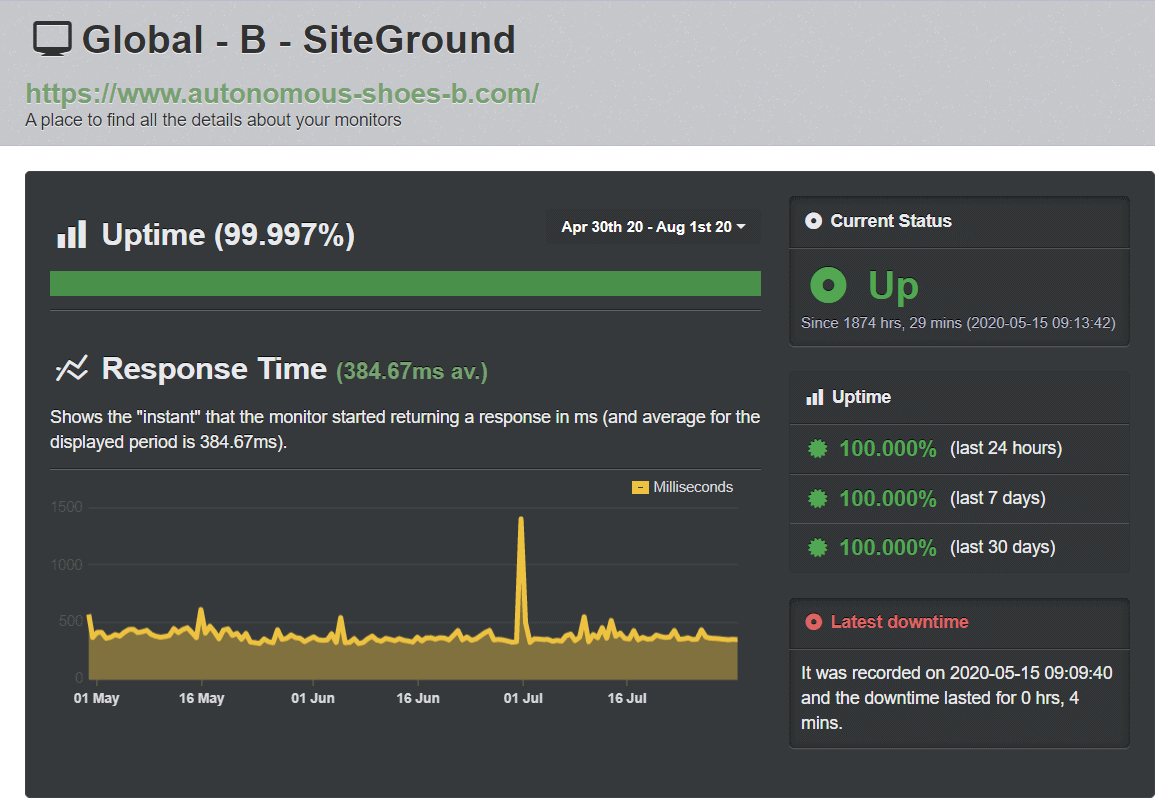
In the same test conducted with GoDaddy, the actual uptime was recorded at 99.974% over three months and 99.957% over one month. While GoDaddy does surpass its uptime guarantee of 99.9%, it still experiences more downtime compared to SiteGround.
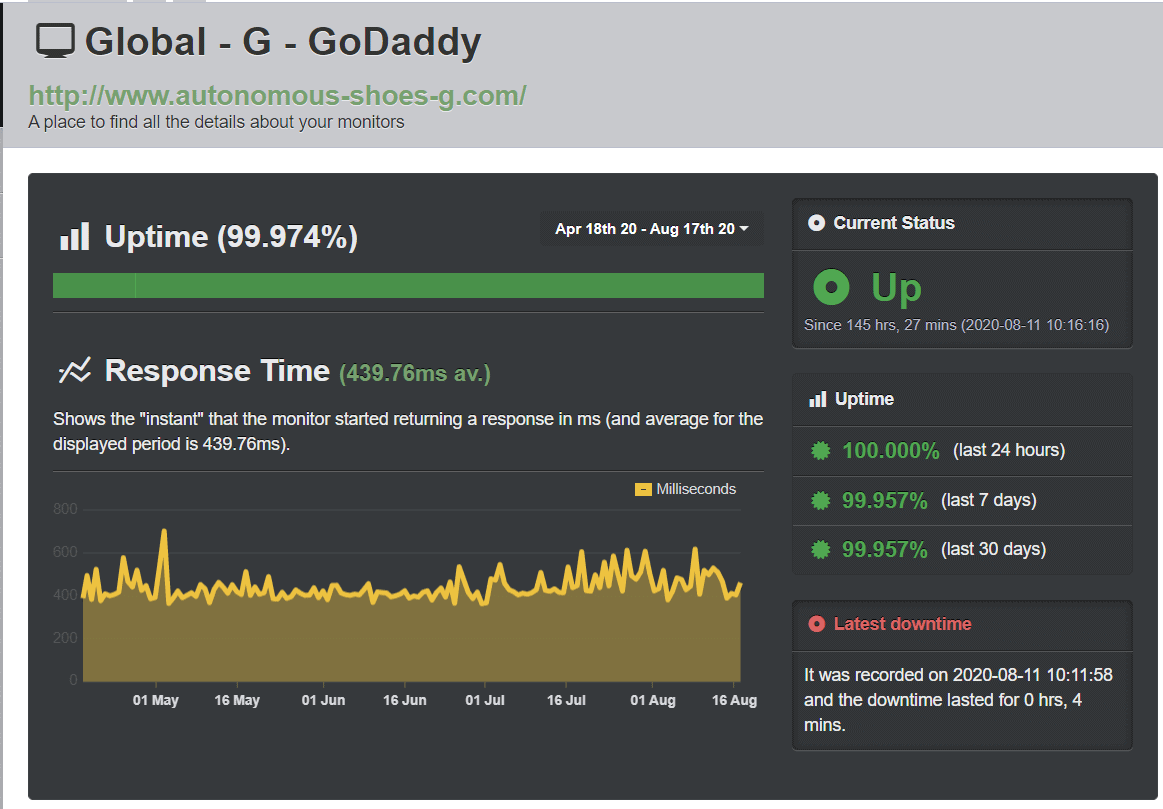
I tested SiteGround’s page loading speed from various locations worldwide using Sucuri. While server locations in North America and some parts of Europe demonstrated encouraging load times, other areas in Europe and Asia experienced significantly slower speeds. As a result, SiteGround received an overall score of B, which is not particularly impressive.

For a deeper look at SiteGround’s performance, check out this comprehensive SiteGround review.
In contrast, GoDaddy did not demonstrate favorable loading speeds across any locations. While the initial connection speeds were acceptable, the time to first byte and overall loading speeds were quite slow, leading to a disheartening global score of F.
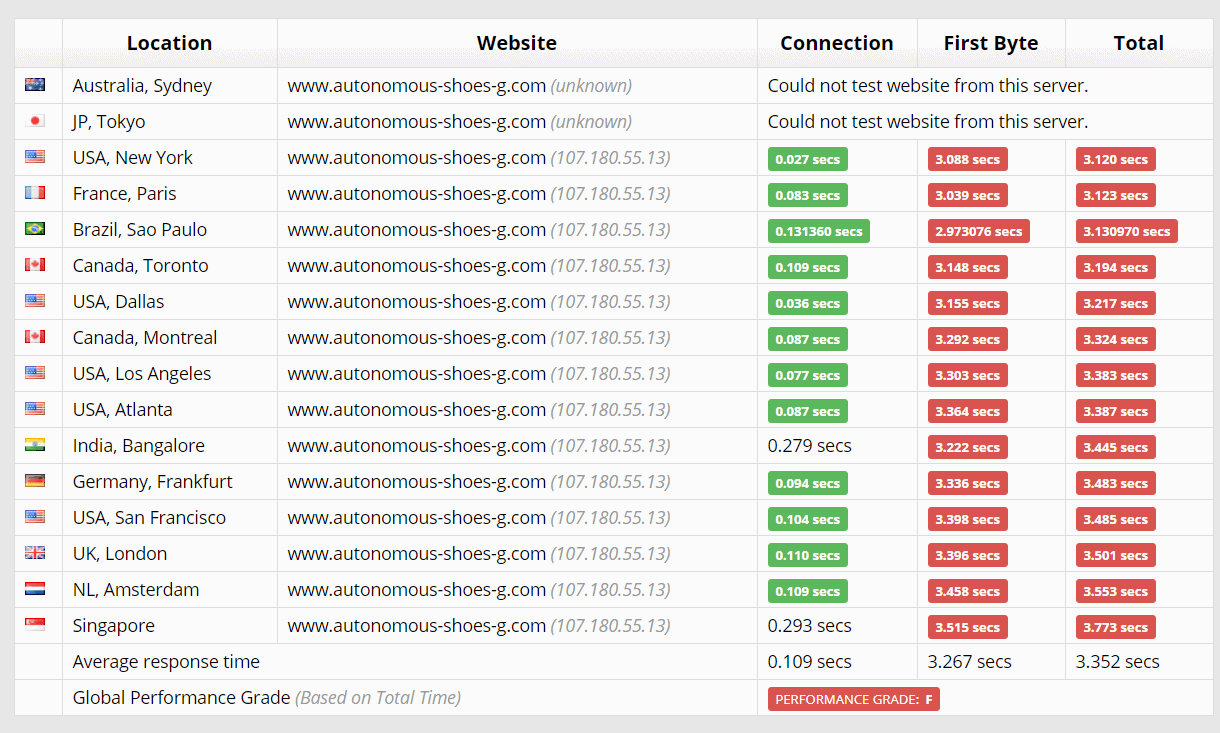
To understand the issues with GoDaddy’s performance, refer to this detailed GoDaddy review.
For a more detailed performance analysis, I utilized GTmetrix to test SiteGround’s page loading speeds from a specific server location in the US. It achieved an impressive page loading score of B, with a percentage of 88%, along with an even higher YSlow score of 90%.
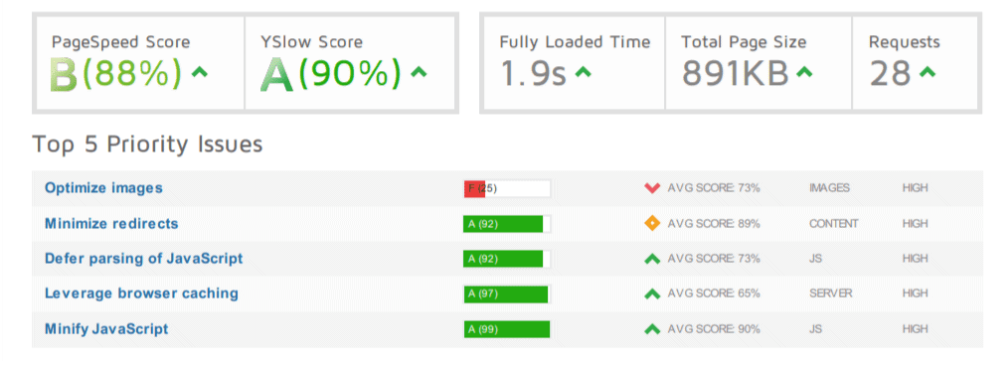
I conducted the same test on GoDaddy using the same server location, but its fastest loading speeds were comparable to the slowest speeds of other hosts. While GoDaddy achieved a good page loading score of A, with a percentage of 94% on GTmetrix, it received a disappointing YSlow score of C, at 72%.
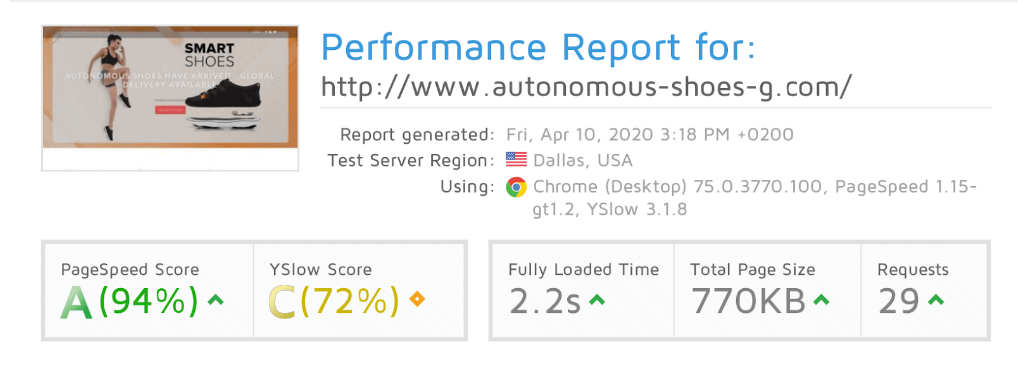
Now, let’s compare SiteGround and GoDaddy regarding performance-enhancing features.
SiteGround operates its services through data centers in the US, UK, the Netherlands, Singapore, and Australia. In contrast, GoDaddy has servers only in the US and India.
All of SiteGround’s plans utilize SSD storage, whereas GoDaddy only includes it with select plans. SSD storage is significantly faster than traditional HDD storage, positively impacting website loading speed, stability, and overall performance.
A Content Delivery Network (CDN) enhances your website’s loading speed by distributing it across a global network of cloud servers. SiteGround offers a free CDN with all its plans, while GoDaddy includes it only with its WordPress hosting plans.
Despite SiteGround outperforming GoDaddy in performance and loading speed tests and providing more performance-boosting features, it still doesn’t rival our top-performing web host, Hostinger.
SiteGround wins the performance comparison, but if you’re seeking a truly fast and reliable web host, Hostinger is an excellent choice!
4. Ease of Use
SiteGround is often regarded as easier to use, particularly for beginners and those who prioritize user experience. Its custom dashboard is intuitive, allowing users to manage their hosting services without feeling overwhelmed. The platform also includes straightforward features like one-click installations for popular applications, making it simple to set up websites. Additionally, SiteGround provides helpful tutorials and a comprehensive knowledge base to guide users through various tasks.
GoDaddy, while user-friendly, can be a bit more complex due to its broader range of services and features. Although it uses cPanel for hosting management, which is familiar to many users, some find the interface cluttered, especially with upsell prompts during the purchasing process. While it offers easy domain management and hosting setup, beginners might feel less supported without the same level of proactive customer assistance that SiteGround provides. Overall, for sheer ease of use and support, SiteGround tends to have the edge over GoDaddy.
Hosting Provided
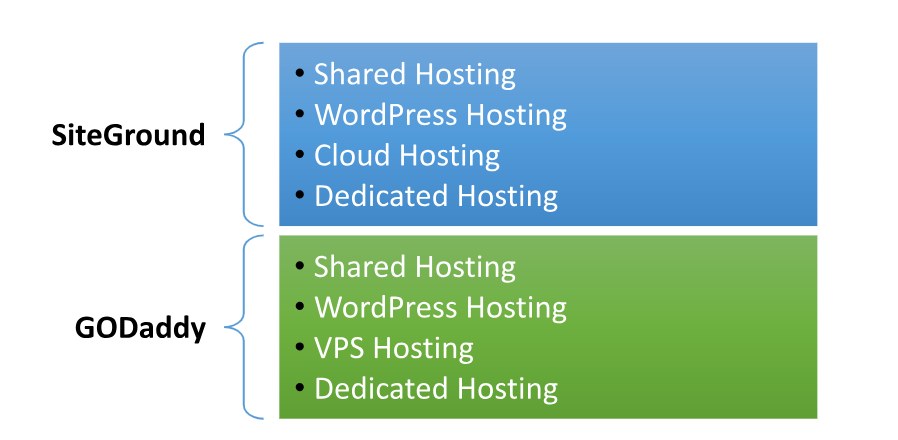
What Our Customers Have to Say?
SiteGround:
Positive Feedback: Customers frequently praise SiteGround for its exceptional customer support, highlighting the responsiveness and knowledge of the support team. Users appreciate the performance and reliability of their hosting services, noting fast load times and minimal downtime. The user-friendly interface and comprehensive tutorials also receive high marks for making website management easier.
Negative Feedback: Some users mention that SiteGround’s pricing can be on the higher side, particularly when renewing after the initial promotional period. A few customers have reported limitations on resources in lower-tier plans, which may require upgrading for more demanding websites.
GoDaddy:
Positive Feedback: GoDaddy is often recognized for its all-in-one service, with many customers appreciating the convenience of managing both domains and hosting in one place. Users also find the initial pricing attractive and enjoy the ease of setting up websites with their user-friendly interface.
Negative Feedback: Many customers express frustration with the customer support experience, citing slow response times and inconsistent assistance. Some users also criticize GoDaddy’s upselling tactics during the purchasing process, feeling that it detracts from the overall experience. Additionally, performance issues have been noted on lower-tier hosting plans.
Advantage of SiteGround & GoDaddy
| SiteGround | GoDaddy |
|---|---|
| Excellent customer support available 24/7 | Comprehensive range of services, including domain registration |
| High performance with SSD storage and caching | Competitive pricing on initial plans |
| Reliable uptime with consistent performance | User-friendly interface for beginners |
| Free daily backups and enhanced security features | Easy domain management |
| Intuitive custom dashboard | Extensive marketing tools and features |
| Free website migration service | Availability of VPS hosting options |
| Built-in staging environment for testing | Good for all-in-one solutions |
Disadvantage of SiteGround & GoDaddy
| SiteGround | GoDaddy |
|---|---|
| Higher renewal prices after initial term | Aggressive upselling during the purchase flow |
| Limited storage on lower-tier plans | Slower performance on lower-tier hosting plans |
| No VPS hosting option | Less reliable customer support response times |
| Slightly more technical for complete beginners | Less advanced performance optimization features |
| Higher cost for advanced plans | Paid website migration and backups |
5. Support
SiteGround’s Support Team is More Knowledgeable and Helpful
Both SiteGround and GoDaddy feature extensive knowledge bases filled with articles and tutorials on a wide range of important topics. Their content is well-structured and easy to navigate, allowing users to quickly find the information they need.
SiteGround offers 24/7 customer support through live chat, phone, and ticketing, though ticket support is limited to current customers. When I tried the live chat, I was promptly connected with an agent who was both knowledgeable and helpful, providing quick and thorough responses to all my questions.
| Support | SiteGround | GoDaddy |
|---|---|---|
| Availability | SiteGround offers 24/7 customer support through live chat, phone, and support tickets | GoDaddy also provides 24/7 support via phone and live chat |
| Response Time | Customers report quick response times, often resolving issues within minutes | Response times can vary; some users experience delays, especially during peak hours |
| Knowledge Base | A comprehensive knowledge base is available, with detailed tutorials and guides to assist users | GoDaddy has a large help center with tutorials, but it may not be as user-friendly as SiteGround’s resources |
| Support Quality | Support staff is highly knowledgeable and proactive, often providing detailed solutions tailored to customer needs | While knowledgeable, customer support experiences can be inconsistent, with some users reporting less effective assistance |
| Specialization | The support team has expertise in WordPress and other popular platforms, making them particularly helpful for related issues | Support covers a wide range of services, but depth of expertise may not be as strong as SiteGround for specific issues |
6. Security
SiteGround Provides a Broader Range of Security Features
SiteGround offers a solid variety of security features across all its plans. These include a web application firewall (WAF), its own AI-powered anti-bot system (which protects against threats like DDoS and Brute-Force attacks), 24/7 server monitoring, and access to the Sucuri-developed SG Scanner for malware protection.
In contrast, GoDaddy’s primary security features are more limited, focusing mainly on 24/7 server monitoring and DDoS protection.
Both hosts use systems to isolate accounts on shared servers for enhanced security. GoDaddy uses CloudLinux OS for its Linux-based shared hosting, while SiteGround employs a similar system called Unique Account Isolation. These systems keep accounts separated from one another on the same server, preventing issues from spreading between accounts and ensuring resources are distributed fairly.
SiteGround provides free SSL certificates with all its plans, while GoDaddy only includes them with certain higher-tier shared and server plans. Additionally, SiteGround offers free daily automatic backups on all its plans, whereas GoDaddy limits this feature to specific plans.
Overall, SiteGround is the clear winner, offering a far more comprehensive range of security features than GoDaddy.
| Security Feature | SiteGround | GoDaddy |
|---|---|---|
| SSL Certificates | Free SSL included with all plans | Free SSL on higher-tier plans only |
| Daily Backups | Daily automatic backups included | Backups available for purchase |
| Malware Scanning | Daily malware scans and proactive security checks | Basic malware scanning on higher plans |
| Firewalls | Advanced firewall protection | Basic firewall protection |
| Account Isolation | Strong account isolation to prevent breaches | Less emphasis on account isolation |
| Two-Factor Authentication (2FA) | Available for added account security | Available, but may require additional setup |
| Security Patches | Regular security updates and patches | Security patches applied, but less frequent |
| DDoS Protection | Included as part of the infrastructure | Basic DDoS protection available |
| Security Policies | Clear policies and procedures for data protection | Security policies available, but less detailed |
Frequently Asked Questions
SiteGround: Offers shared, cloud, WordPress, and dedicated hosting.
- GoDaddy: Provides shared, VPS, WordPress, and dedicated hosting.
- SiteGround: Generally, offers better performance with faster load times and superior uptime.
GoDaddy: Adequate performance, but may be slower on lower-tier plans.
- SiteGround: 24/7 support via live chat, phone, and tickets, known for quick responses.
GoDaddy: 24/7 support via phone and live chat, but response times can be slower.
- SiteGround: Yes, free SSL certificates are included with all plans.
- GoDaddy: Free SSL is included only on higher-tier plans.
- SiteGround: Yes, daily automatic backups are included.
GoDaddy: Backups are available but often require a paid option.
- SiteGround: Offers an intuitive custom dashboard that is easy for beginners.
- GoDaddy: User-friendly but can feel cluttered, especially with upselling.
- SiteGround: Includes free SSL, daily malware scans, and proactive security checks.
GoDaddy: Basic security features, with malware scanning available on higher plans.
- SiteGround: Offers free website migration services.
GoDaddy: Website migration is available but often at an additional cost.
- SiteGround: Typically higher renewal prices after the initial term.
GoDaddy: Initial pricing is lower, but renewal costs can increase significantly.
- SiteGround: Offers a 30-day money-back guarantee.
GoDaddy: Provides a 30-day money-back guarantee on hosting services.
- SiteGround: Does not have its own website builder but supports popular CMSs like WordPress.
- GoDaddy: Offers a built-in website builder with various templates.
- SiteGround: Highly recommended for WordPress users due to performance and support.
- GoDaddy: Offers WordPress hosting but may not match SiteGround’s performance or support level.
Visit Link
Quick Link
Contact Us
Jhansala, Punjab – 140601
info@comparexpert.in
+91 85790 13995
© 2024 comparexpert.in. All rights reserved.




